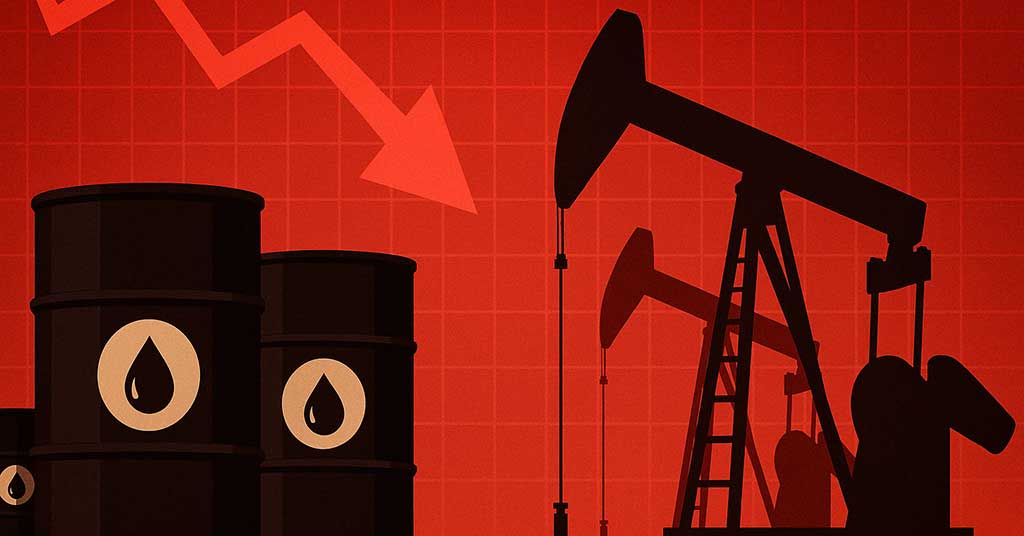Canada, and the world, brace for impact as global oil prices plunge and economic risks grow
A wave of new tariffs and growing geopolitical tensions—particularly between the U.S., China and other major economies—has rattled global trade and energy markets. The resulting slowdown in economic activity is dragging down demand for crude oil. Fears of a global recession, or even depression, can no longer be dismissed.
Crude producers all around the globe—Canada included—stand to be severely impacted if the crisis continues.
What will this crisis mean for major oil producers? The signs are already clear.
Last week, Goldman Sachs chopped its expected annual price outlook for West Texas Intermediate (WTI) crude for the next year to US$55 a barrel because of the possible stagnation of the U.S. economy.
The current scenario will impact all producers, coming under pressure from the lowest crude prices since the COVID-19 pandemic.
Canada is one of the world’s top crude oil producers, and its sector is feeling the effects. Alberta, which holds nearly all of the country’s proven oil reserves, is being hit the hardest by the turmoil.
Chris Varcoe, writing in the Calgary Herald, notes that every $1-a-barrel drop in WTI oil prices over the year would prune provincial revenues by $750 million, while every $1 decrease in the light-heavy oil price differential, which has narrowed recently, would increase revenues (of the province) by $740 million.
The Alberta government is striving to overcome this crisis. But there is a limit to what the province could do.
“If we’re in the middle of what could be a global recession, there’s nothing that I or any subnational government can do other than try to weather the storm,” Premier Danielle Smith of Alberta rightly pointed out.
To explore additional trade markets to somehow offset declines in oil trade with the U.S., Smith is scheduled to travel to South Korea and Japan later this month.
The impact will not be limited to Alberta. There would be repercussions on the economy of the entire country. In a somewhat similar situation in 2021, when oil markets faced headwinds, a Canadian Energy Research Institute (CERI) report pointed out that Canada’s economic growth would be slowed by 23 per cent through the year.
Other producers, too, are in the same boat. Heavyweight Saudi Arabia faces stark choices. With prices much lower than its breakeven price, US$90 a barrel as per the IMF projections, Saudi Arabia may have to accelerate government borrowing and slow or delay spending on its ambitious, futuristic, megalomaniac projects.
The kingdom’s budget deficit may soar to US$67 billion this year, according to projections shared by Goldman Sachs. That’s nearly double what Saudi Arabia had originally projected. The price decline threatens to erase tens of billions of dollars of Saudi revenue, along with a planned drop in dividends from state-controlled energy giant Saudi Aramco.
Aramco’s dividends are now expected to fall by a third this year. As a result, the Saudi government will receive about US$32 billion less in revenue, while the Public Investment Fund (PIF) will see a shortfall of around US$6 billion, according to Reuters calculations. The PIF, valued at US$925 billion and responsible for advancing Crown Prince Mohammad bin Salman’s Vision 2030 plan, partly depends on oil revenues, including its shares in Aramco.
“Saudi Arabia is (now) likely to rely on debt financing, and it will have to delay or scale back some planned contracting awards given 2024 was already in a twin deficit,” Karen Young, senior research scholar at Columbia University’s Center on Global Energy Policy, told Reuters while referring to fiscal and current account deficits.
Other oil producers are also seeking to shore up finances amid the global crude price plunge. Last month, Kuwait passed a law to allow its government to tap international debt markets for the first time since 2017.
Brazil is preparing an extra auction this year for stakes in offshore oil areas to boost revenue, Reuters reported. The plan gained steam due to the fall in oil prices and rising global trade uncertainty, the report added. Claudio Castro, governor of the state of Rio de Janeiro, said he planned to limit spending as Brazil’s 2025 budget was based on an average Brent price of US$80.79.
Pressure is also mounting on the Russian central bank to lower interest rates despite persistent inflation. Moscow had based its 2025 budget on an average price of US$69.70 per barrel. That is no longer the case. Similarly, the Mexican government was expecting US$62.50 a barrel for its oil output.
The price plunge is likely to curb Baghdad’s infrastructure building spree. For Iraq, which depends almost exclusively on oil revenues for spending, crude prices below US$70 are a problem.
Nigeria was expecting to draw more than half of its total revenues from energy exports. Analysts say the government needs to reassess these targets to reflect global realities.
Even before the recent fall in oil prices, Venezuelan President Nicolas Maduro had already reduced public workers’ hours to curb power consumption, including at the state oil company PDVSA. He also declared an economic emergency in the South American country. Lower oil prices will increase pressure on Maduro to curb spending further, Reuters added.
Iran relies on oil revenues for around a third of its budget, with its benchmark price set at 57.50 euros ($90.56) per barrel. Besides lower global oil market prices, Tehran is also concerned about Trump’s renewed “maximum pressure” campaign, which targets Chinese buyers of Iranian oil.
All oil producers have major adjustments to make.
Toronto-based Rashid Husain Syed is a highly regarded analyst specializing in energy and politics, particularly in the Middle East. In addition to his contributions to local and international newspapers, Rashid frequently lends his expertise as a speaker at global conferences. Organizations such as the Department of Energy in Washington and the International Energy Agency in Paris have sought his insights on global energy matters.
Explore more on Energy sector, Alberta’s Business, Canadian economy, World economy
The views, opinions, and positions expressed by our columnists and contributors are solely their own and do not necessarily reflect those of our publication.
Troy Media empowers Canadian community news outlets by providing independent, insightful analysis and commentary. Our mission is to support local media in helping Canadians stay informed and engaged by delivering reliable content that strengthens community connections and deepens understanding across the country.




